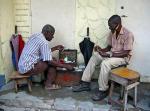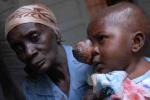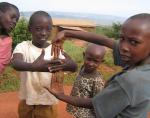Preval Hits the Road: Dicusses Public Health and Self-Reliance
 Haitian leaders tend to get bogged down in ever-unstable Port au Prince. It is a matter of political survival. However, most of Haiti is rural and certainly most of what is good about Haiti is to be found outside of its largest city. Recently President Preval made a public tour of the Central Plateau. We were happy to see that public health was a recurring theme of his trip. Regardless of one's political beliefs, we can all agree increased attention to public health is essential. When a person has health, a person has hope. Where there is hope, there is also the possibility of development and a better future.
Haitian leaders tend to get bogged down in ever-unstable Port au Prince. It is a matter of political survival. However, most of Haiti is rural and certainly most of what is good about Haiti is to be found outside of its largest city. Recently President Preval made a public tour of the Central Plateau. We were happy to see that public health was a recurring theme of his trip. Regardless of one's political beliefs, we can all agree increased attention to public health is essential. When a person has health, a person has hope. Where there is hope, there is also the possibility of development and a better future.








